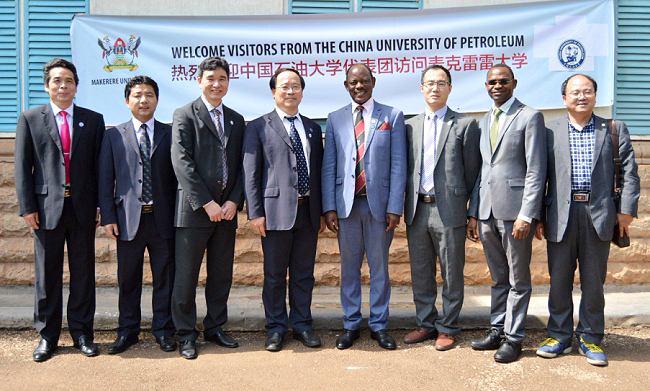On 7th January 2019, Makerere University together with the China University of Petroleum (UPC) signed an agreement to co-establish and operationalize the Institute of Geoscience and Petroleum at Makerere University. The agreement was signed by the Vice Chancellor Prof Barnabas Nawangwe and the Vice President of China University of Petroleum Prof. Jun Yao on behalf of the two universities respectively. The two parties agreed to develop and implement;
1. A curriculum System Construction and Development Plan for both undergraduate and postgraduate-level students of petroleum engineering programs including short professional development courses
2. Teaching – staff training and upgrading plan
3. Students Joint Education Designing and Implementation plan
4. Textbooks compiling and development plan
5. Teaching infrastructure and equipment building plan
6. Internship base establishment and development plan and China University of Petroleum Training Centre Expansion Plan
7. Joint International Lab Establishment and Development Plan
8. Research Capacity Building and Upgrading Plan
9. Academic Exchange Implementation Plan

The agreement activates the Memorandum of Understanding (MoU) that was signed on 19th December 2017 by the two universities to establish the institute of Geosciences and Petroleum. According to Prof. Barnabas Nawangwe, Makerere University is ready to engage in research and build capacity in the area of oil and gas in Uganda and the region.
“We are all aware that Uganda and the nearby countries are exploring oil and they are on the stage of production however, we are facing immense challenges of lack of qualified manpower and expertise in the petroleum industry. Therefore, establishing the Institute of Geosciences and Petroleum at Makerere University will be an open opportunity to carry out research and build capacity in this area,” said the Vice Chancellor.
Prof. Nawangwe commended UPC for its expertise in preparing qualified engineers and technical service personnel for global oil industry through its education and research. “We are happy that you accepted to share with Makerere University your knowledge and experience in geoscience and petroleum,” he said. He thanked the Government of Uganda for working hand in hand with Makerere University to bridge the knowledge gap that exist in the gas and oil sector.

In 2009, Makerere University introduced the Bachelor of Science programme in Petroleum Geosciences and Production to bridge the knowledge gap that exists in the oil and gas sector in Uganda. The course aims at training Petroleum Geoscientists who can contribute effectively to programmes of exploration and development of petroleum resources.
“At the end of the training, we expect our students to be able to identify the key geological features associated with petroleum resources in the context of their discovery and economic viability; execute and interpret information from remote sensing, geological, geophysical and geochemical data during petroleum exploration; apply geological, geophysical and geochemical knowledge in the development of petroleum resources among others,” he said.
“Petroleum resources have been discovered in the region, in Uganda and Sudan in particular whereas gas has been discovered in the Songo Songo Island and Mnazi Bay in Tanzania. There is little experience in the area of petroleum geoscience and production in Uganda and the region as a whole. There is therefore a need to train local human resource in the development and sustainability of the petroleum industry,” added the Vice Chancellor.

In his remarks, Prof. Jun Yao commended Makerere University for the tremendous research that is carried out in the area of Science, Technology, Engineering and Mathematics (STEM). He looked forward for a successful implementation and operational journey of the establishment of the Institute of Geosciences and Petroleum at Makerere University.
The 19th December 2017 MoU was signed by Prof. Barnabas Nawangwe and the Vice President of China University of Petroleum, Qingdao (UPC) – Prof. Liu Huadong. The MoU stipulated that the universities agreed to jointly apply for funding from international funding agencies to support establishment of state of the art petroleum engineering labs at China University of Petroleum and Makerere University. This fits in well with the appointment of Makerere University as the Centre of Excellence for petroleum and minerals by the Northern Corridor States.
Prof. Jun Yao was a companied by eight delegates from UPC who proceeded to tour some of the labs at the College of Agricultural and Environmental Sciences (CAES) and College of Engineering, Design, Art and Technology (CEDAT).
Article Written by: Mak Public Relations Office.
Related article
CEDAT Hosts Delegation from the China University of Petroleum

 General2 weeks ago
General2 weeks ago
 Natural Sciences2 weeks ago
Natural Sciences2 weeks ago
 Agriculture & Environment1 week ago
Agriculture & Environment1 week ago
 General6 days ago
General6 days ago
 Health2 weeks ago
Health2 weeks ago






